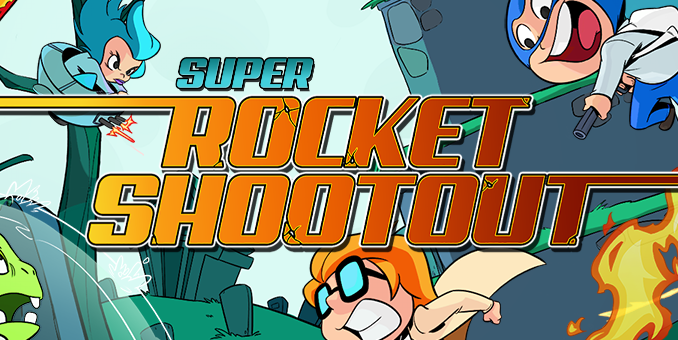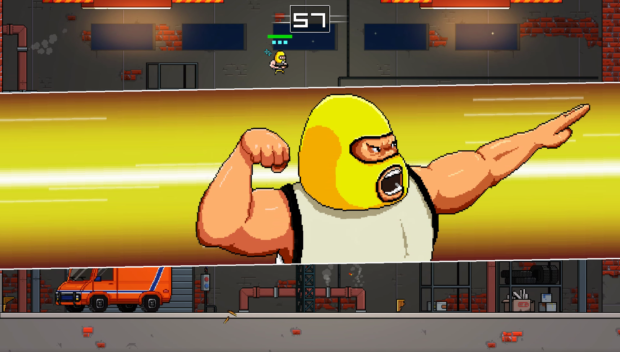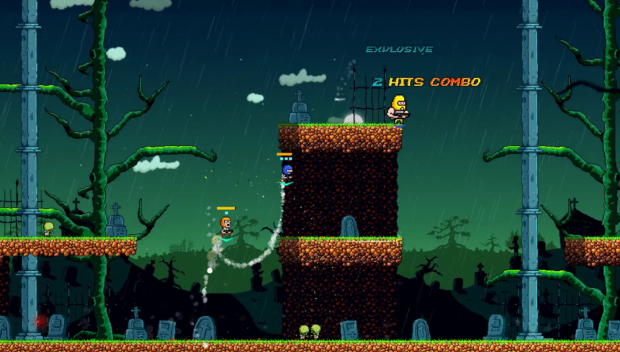
 Review Fix chats with Super Rocket Shootout creator Renaud Despinois, who lets us know exactly why it’s one of the coolest indie games on Steam this summer.
Review Fix chats with Super Rocket Shootout creator Renaud Despinois, who lets us know exactly why it’s one of the coolest indie games on Steam this summer.
Review Fix: How was this game born?
Renaud Despinois: Super Rocket Shootout started as my get-to-know-Unity project. I knew right from the start I wanted to experiment around 2D platforming mechanics and dynamic gameplay. Around the same time, I was always complaining not being able to play games with my girlfriend that didn’t become too easy and/or unbalanced for a skilled player versus a casual one. Games like Mario Kart to sum it up: it’s super accessible yet profound, and you can have a blast even if you’re competing with differently skilled adversaries.
So taking all of this in account I started to think of Super Rocket Shootout’s concept.
Review Fix: What was development like?
Despinois: Pretty chaotic. Firstly because I do/did everything on my own, and it’s hard to keep up with your motivation and of course, because things advance more slowly than when you’re in a team.
Besides I made a lot of other small games along the way (during gamejams) to gain experience as a game designer, and as some of them caught the eye of publishers, I had to put Super Rocket Shootout on hold to develop those other games that, at that time at least, looks more promising.
And on top of that I had to go trough a breakup and get back to my native country after 8 years living abroad, and that didn’t make things easier for Super Rocket Shootout’s development.
Review Fix: What makes this game special?
Despinois: As one of my initial goal, I guess the game is instantly fun for anybody to play. I’ve showcased it numerous events and I’m amazed of how wide the audience has always been:5 yo kids, fathers, hardcore and casual gamers. It illustrates well the fact that the game is super accessible, but also quite deep as you gain knowledge of all the moves and technics, all the subtleties that can make you a more skilled player.
Besides, with all the elements in the game (destructible environments, crazy extra weapons, super challenging AI), you’ll always find yourself facing new situations. Even I still have fun to play my game after all those years as there is always something new that will come up.
Review Fix: What games influenced this one the most?
Despinois: The main influence behind Super Rocket Shootout is a 1994 arcade game called The Outfoxies. I discovered it quite late, but when I did, I was amazed by how innovative that game was for its time. It’s a totally underrated gem: the gameplay is super dynamic, the stages are huge with tons of things happening, there are tons of weapons. When I discovered about this game, I couldn’t understand why there hadn’t been any sequel or remake. So I decided to inspire me a lot of this game, and as the same time, to bring fresher mechanics from fighting games such as Street Fighter (combos, super gauge, special moves…) and the fun of local multiplayer games such as Bomberman.
 Review Fix: As an indie studio, what do you think you guys do differently than the big studios?
Review Fix: As an indie studio, what do you think you guys do differently than the big studios?
Despinois: I guess I’m in an even more special situation myself, being a one-man team, but I guess what makes a big difference is how fast and reactive you can be with your decisions. You have total control of your ideas and as long as they match your game’s vision, you don’t have to waste time and effort in communicating, arguing: Â you just do it, test it, and if the team agrees, then it’s a go. In big studios, you’re a small wheel of a big machinery. Of course, you’re participating to something great but it’s harder to get heard or credited for your ideas, and you’re always caught up in hierarchical/chain-of-command bureaucracy.
Review Fix: Any fun stories or wild moments during development?
Despinois: There was this one kid at an event in Madrid. He came to the stand with his parents, played the game and had a great time. Then the next day, he comes back and tells me: “I didn’t have one so I’ve just bought a game controller to play your game at home. So can you just sell me your game now so I can go home and play with my siblings?” And it was an heartbreaking moment when I had to tell him that the game was far from being released and that sadly, there was no way he could play the game at home and he may have bought the game controller for nothing… But I’m sure he used the controller for many other games and now that the game is releasing, I hope he still remembers it!
Review Fix: How does this game disrupt the video game landscape?
Despinois: Super Rocket Shootout goes against the flow of actual games for two main reasons: first because it says you don’t need cutting edge graphics to have a fun game, it’s all in the design of the mechanics, the balance of its elements that a game can be intrinsically fun. Secondly because with the ever growing online competitive gaming, players tend to forget that gaming can also be a fun activity when practiced together on a couch. Twenty years ago, a big part of gaming was going to your friends’, spending time playing together. Some players have had the chance to experience that, younger ones haven’t, but I’m glad that games like Super Rocket Shootout try to (physically) bring back players together.
Review Fix: Who will enjoy this game the most?
Despinois: The game will be enjoyed by a large panel of gamers, ranging from kids to passionate gamers, but I guess it will most appeal to 30-40-year-old gamers who have nostalgia for good old retro arcade games and fun couch multiplayer sessions.
They’ll remember the good old times when they gathered at a friend’s house and spent the afternoon and evening playing 4 players multiplayer gems.
Review Fix: How do you want this game to be remembered?
Despinois: I’d like SRS to be remembered as an instantly fun game, the one good option you pick when friends gather at your house and you want to play some local multiplayer game. I’d also want it to be remembered as a challenging retro game for a solo gamer who wants small and intense gaming sessions: I’m always in to try and beat arcade mode without dying with this character or that one.
Review Fix: What are your goals for the game?
Despinois: I hope the game will sell at least a few thousands units, not because it will make the project financially profitable (it definitely won’t, even if it’d sell 10k units) but because I really want the greater number of people to enjoy its fun brawls and also because I hope it will give me credentials for my next project, for contacting publishers and/or press or in order to gather a bigger team. You see, in the indie game industry, there are two categories of dev: the ones who have shipped a commercial game, and the ones who haven’t. Being able to be in the first group is already an achievement by itself!
Review Fix: What’s next?
Despinois: I’ve already started working on my next commercial game: a pixelart RPG mixing 3D exploration, 2D platforming and a unique rhythm-based auto-combat system, set in a dystopian world immersed in hip-hop culture.
I’m now a way more experienced game designer as when I started SRS, and I know I can ship a game. So it will definitely be hard, but I’m more focused and even more thrilled with this new project than ever.


Leave a Reply